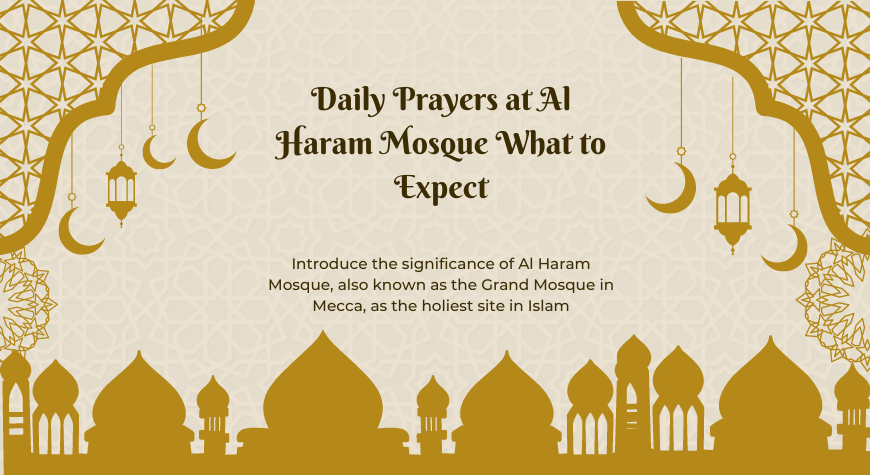Daily Prayers at Al Haram Mosque What to Expect

Importance of Al Haram Mosque:
- Introduce the significance of Al Haram Mosque, also known as the Grand Mosque in Mecca, as the holiest site in Islam.
- Mention its historical and religious importance for Muslims worldwide.
Preparation for Prayer:
- Describe the process of preparing for prayer, including ritual cleansing (ablution or wudu) which is required before entering the mosque.
- Explain the significance of spiritual readiness and intention (niyyah) before starting prayer.
Timing of Prayers:
- Outline the five daily prayers (Salat) observed by Muslims: Fajr, Dhuhr, Asr, Maghrib, and Isha.
- Highlight the precision and importance of adhering to prayer times, often marked by the call to prayer (Adhan).
Rituals and Etiquette:
- Detail the movements and recitations involved in each prayer cycle (Rak’ah) performed within the mosque.
- Discuss the etiquette of prayer, including facing the Kaaba in Mecca and maintaining focus and humility throughout.
Mosque Atmosphere:
- Capture the atmosphere of Al Haram Mosque during prayer times, emphasizing the unity and diversity among worshippers.
- Mention the serene environment and the spiritual energy that permeates the mosque during these sacred moments.
Community and Unity:
- Highlight the communal aspect of prayer at Al Haram Mosque, where Muslims from diverse backgrounds come together in worship.
- Discuss the sense of unity and solidarity experienced during congregational prayers, especially during Friday prayers (Jumu’ah).
Cultural Insights:
Touch upon the cultural aspects and traditions observed by worshippers at Al Haram Mosque, enhancing the understanding of Islamic practices.
Conclusion:
- Summarize the spiritual and cultural significance of daily prayers at Al Haram Mosque, emphasizing its role in fostering devotion and spiritual growth among Muslims.
- Encourage readers to visit and experience the profound atmosphere of this sacred place firsthand.

